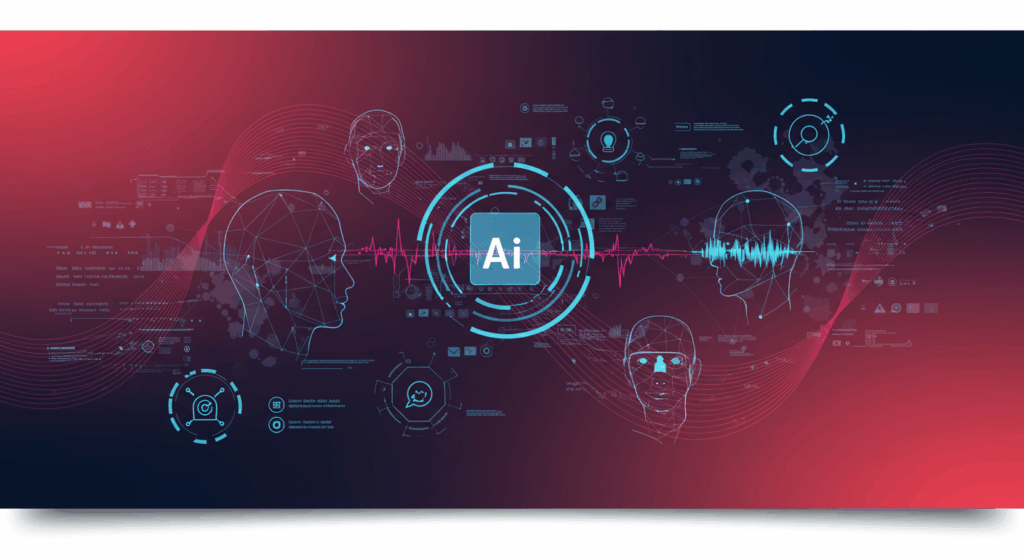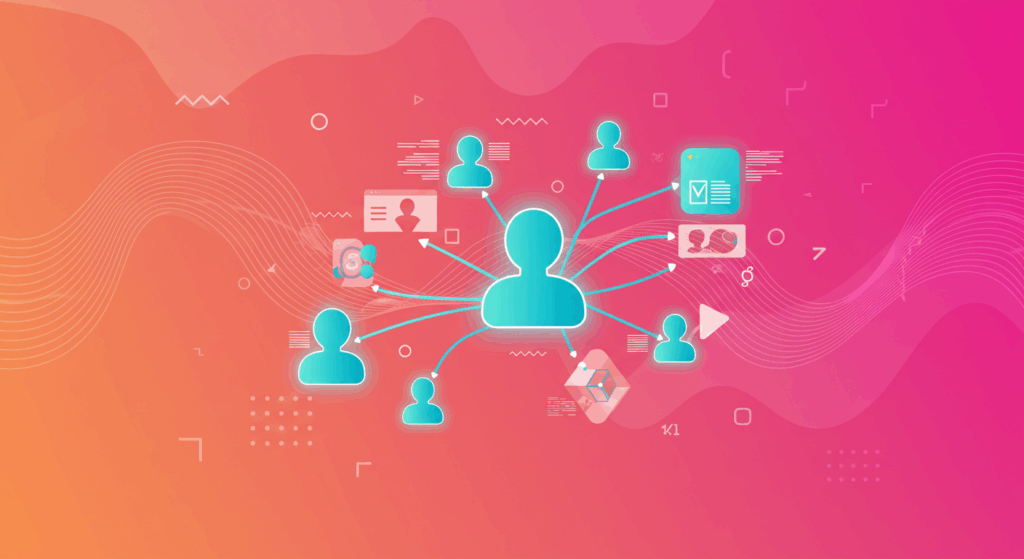AI agents represent the next evolution of marketing automation, capable of autonomous decision-making and real-time adaptation.
- Unlike traditional AI tools, they learn and adjust strategies independently based on real-time data
- Market projected to reach $47.1 billion by 2030, with 85% of enterprises planning adoption
- Key applications include content personalization, campaign optimization, and lead qualification
- Deliver up to 50% efficiency improvements and 30% cost reductions compared to traditional automation
Recommendation: Start with single-agent systems for specific use cases before scaling to multi-agent workflows for maximum ROI.
Marketing teams generate thousands of leads monthly, create countless pieces of content, and manage complex campaigns across multiple channels. Yet traditional automation tools often fall short when buyer behavior becomes unpredictable or market conditions shift rapidly. AI agents in digital marketing are changing this reality by introducing autonomous systems that think, learn, and adapt.
Unlike the static automation tools of the past, AI agents operate with a level of intelligence that mirrors human decision-making. Instead of just following pre-programmed rules, they analyze behavioral signals, infer intent, and take the next best action to achieve marketing objectives. The global AI agents market is projected to explode from $5.4 billion in 2024 to $50.3 billion by 2030, representing a compound annual growth rate of 45.8%.
Marketing teams using AI agents report measurable improvements: early enterprise deployments have yielded up to 50% efficiency improvements in customer service, sales and HR operations, cost reductions through automated customer inquiry handling, and significantly faster campaign optimization cycles. The question isn’t whether AI agents will transform digital marketing; it’s how quickly your organization can harness their potential.
What Are AI Agents, and How Do They Differ from Traditional AI Tools?
AI agents create a shift from reactive automation to proactive intelligence. While traditional AI tools excel at specific tasks like generating content or analyzing data in response to prompts, AI agents operate autonomously to achieve broader objectives. They observe their environment, make decisions, and take actions without constant human intervention.
The key difference lies in their operational philosophy. Traditional marketing automation follows rigid “if-then” logic: if a user opens an email, send a follow-up message. AI agents, however, simultaneously process multiple signals and adapt their approach based on context. They might analyze a prospect’s website behavior, social media engagement, and email interactions to determine the optimal next touchpoint and timing.

AI agents for digital marketing possess four critical capabilities that distinguish them from conventional tools.
- First, they demonstrate autonomy by operating independently within defined parameters.
- Second, they exhibit learning behavior, improving performance based on outcomes and feedback.
- Third, they maintain goal orientation, focusing on specific objectives rather than just completing tasks.
- Finally, they show adaptability, adjusting strategies when conditions change.
Consider the difference between a traditional email automation sequence and an AI agent managing customer engagement. The automation sequence sends predetermined messages at fixed intervals regardless of recipient behavior. An AI agent, however, might notice that a particular prospect engages more with video content on Tuesday mornings and adjust both the content type and delivery timing accordingly. This level of contextual intelligence transforms static workflows into dynamic, responsive systems.
Artificial intelligence content marketing has evolved through three distinct phases. First came AI assistants that helped marketers create content and optimize messaging. Next arrived AI automation that streamlined repetitive tasks and workflows. Now, AI agents in digital marketing represent the third phase: autonomous systems that manage entire marketing functions end-to-end, making strategic decisions and executing complex campaigns with minimal human oversight.
Why Are AI Agents Transforming Digital Marketing in 2025?
The combination of several market forces is driving unprecedented adoption of AI agents across marketing organizations. Enterprise buyers increasingly expect personalized experiences at every touchpoint, yet traditional systems struggle to deliver relevance at scale. Meanwhile, marketing teams face mounting pressure to create more content, manage more channels, and optimize more campaigns with constrained resources.
Current statistics reveal the scope of this transformation. Eighty-five percent of enterprises plan to deploy AI agents by 2025, primarily to enhance customer experience and operational efficiency. In customer service alone, organizations report that AI agents save significant time, while most consumers don’t care whether they interact with humans or AI agents as long as their problems get resolved quickly.
The business impact surpasses efficiency gains. Companies implementing AI agents report 76% improvements in e-commerce operations, significant increases in case resolution rates, and substantial reductions in manual workloads. These improvements compound over time as AI agents learn from each interaction and continuously optimize their performance.
Market demand for hyper-personalized experiences is another driving factor. Consumers expect personalized interactions with brands, yet traditional segmentation approaches can’t keep pace with individual preferences and behaviors. AI agents create dynamic customer profiles that update in real time, enabling personalization that feels genuinely relevant rather than generically targeted.
The technological infrastructure supporting AI agents has also matured. Advances in natural language processing, machine learning algorithms, and cloud computing make it possible to deploy sophisticated AI agents without massive technical overhead. Integration capabilities have expanded dramatically, allowing AI to work seamlessly across marketing technology stacks and coordinate actions across multiple platforms.
7 Game-Changing Applications of AI Agents in Digital Marketing

1. Content Creation and Optimization
AI agents revolutionize content operations by managing the entire lifecycle from ideation to distribution. Unlike simple content generators, these agents analyze audience engagement patterns, brand guidelines, and performance metrics to create materials that align with strategic objectives. They can automatically generate blog posts, social media content, and email campaigns while maintaining a consistent brand voice and optimizing for specific conversion goals. These capabilities represent a significant advancement in artificial intelligence content marketing capabilities.
2. Real-Time Campaign Personalization
Traditional A/B testing requires weeks to generate meaningful results. AI agents enable real-time personalization by adjusting campaign elements based on immediate user responses. They modify ad creative, update targeting parameters, and continuously optimize bidding strategies, ensuring campaigns perform at peak efficiency throughout their runtime rather than waiting for post-campaign analysis.
3. Lead Qualification and Scoring
Most marketing teams struggle with lead quality, passing unqualified prospects to sales teams while genuine opportunities slip through the cracks. AI agents analyze behavioral signals, demographic data, and engagement patterns to identify high-intent prospects. They can automatically route qualified leads, trigger appropriate nurture sequences, and alert sales teams when prospects show buying signals.
4. Social Media Management
Managing social media presence across multiple platforms requires constant attention and strategic thinking. AI agents monitor brand mentions, engage with followers, and publish content according to optimal timing algorithms. They can detect sentiment shifts, identify trending topics relevant to your brand, and automatically adjust posting strategies to maximize engagement and reach.
5. Email Marketing Automation
Beyond basic drip campaigns, AI agents create sophisticated email marketing programs that adapt to individual subscriber behavior. They determine optimal send times for each recipient, customize subject lines based on historical open rates, and automatically adjust email frequency based on engagement levels. This personalized approach consistently outperforms static automation sequences across key engagement metrics.
6. Customer Journey Orchestration
AI agents excel at managing complex customer journeys that span multiple touchpoints and channels. They track prospects across websites, social media, email, and advertising platforms, creating unified profiles that inform strategic decisions. When a prospect shows interest in a particular product category, the agent might simultaneously adjust ad targeting, trigger relevant email content, and personalize website experiences.
7. Performance Analytics and Optimization
Rather than generating static reports, AI agents provide dynamic insights that inform immediate action. They identify underperforming campaign elements, suggest optimization strategies, and automatically implement approved changes. Continuous optimization means campaigns improve daily rather than monthly, maximizing return on advertising spend and overall marketing effectiveness.
How AI Agents Deliver Superior Results: Capability Examples
The practical potential of AI agents becomes clear when examining their core capabilities in action. Consider how an e-commerce company could deploy AI agents to manage product recommendation engines across their website and email campaigns. These agents would analyze browsing behavior, purchase history, and seasonal trends to suggest products with higher conversion rates than traditional recommendation algorithms, potentially increasing revenue per email significantly over time.
In B2B scenarios, AI agents could transform lead qualification and early-stage nurturing processes. By analyzing form submissions, website behavior, and external data sources, these agents would score leads dynamically. High-scoring prospects would receive immediate sales outreach, while lower scoring leads would enter automated nurture sequences, potentially increasing sales-qualified lead rates while reducing sales team workload.
Financial services organizations could implement AI agents to personalize content marketing programs. These agents would analyze customer data to identify topics of interest, automatically generate relevant articles and guides, and distribute content through appropriate channels. Such implementations could improve content engagement rates while reducing production costs and increasing publishing frequency.
Customer service represents one of the most promising applications. Telecommunications companies, for example, could deploy AI agents to handle customer inquiries across chat, email, and social media. These agents would resolve the majority of inquiries without human intervention while maintaining high customer satisfaction scores, potentially reducing response times from hours to minutes while achieving significant cost reductions.
Generative AI for content creation reaches new levels of sophistication when powered by AI agents. Rather than simply generating content on demand, these agents analyze performance data, audience feedback, and competitive intelligence to create materials that align with strategic objectives. They can produce hundreds of content variations, test them systematically, and optimize based on engagement metrics. This evolution demonstrates how AI agents in digital marketing are transforming traditional content operations workflows.
What to Consider When Implementing AI Agents in Your Marketing Strategy?
Successful AI agent implementation requires careful planning and realistic expectations. Organizations should begin by identifying specific pain points where autonomous decision-making would provide clear value. Customer service inquiries, lead qualification, and content personalization represent ideal starting points because they involve repetitive decisions with measurable outcomes. When implementing AI agents in digital marketing, teams must also consider how these systems will integrate with existing artificial intelligence content marketing workflows.
Technology infrastructure assessment comes next. AI agents require robust data integration capabilities to access customer information, campaign performance metrics, and external market data. Organizations with fragmented technology stacks may need to invest in data unification before effectively deploying agents. Cloud-based platforms typically offer easier integration paths compared to on-premises systems.
Budget considerations extend beyond initial software costs. AI agents require ongoing training, monitoring, and optimization to maintain peak performance. Organizations should allocate resources for data quality management, agent training, and performance monitoring. The investment typically pays for itself within 6–12 months through efficiency gains and improved campaign performance.
Change management represents another critical factor. Marketing teams need training on how to work alongside AI agents rather than viewing them as replacement tools. Successful implementations emphasize human-AI collaboration, where agents handle routine decisions while humans focus on strategy, creativity, and relationship building. Clear guidelines about agent capabilities and limitations help teams effectively leverage the technology.
Performance measurement frameworks should be established before deployment. Organizations need to define success metrics, establish baseline performance levels, and create monitoring systems to track agent effectiveness. Regular performance reviews ensure agents continue meeting business objectives and identify opportunities for optimization or expansion.
What Does the Future Hold for AI Agents in Digital Marketing?
The evolution toward multi-agent systems represents the next frontier in marketing automation. Rather than deploying individual agents for specific tasks, organizations will orchestrate teams of specialized agents that collaborate to achieve complex objectives. Imagine a coordinated system where content agents create materials, distribution agents optimize placement, and analysis agents provide performance insights, all working together seamlessly. This collaborative approach will define the future of AI agents in digital marketing, particularly for organizations managing enterprise-scale content operations.

Voice-enabled AI agents will expand beyond simple chatbots to sophisticated conversational marketing systems. These agents will conduct natural conversations with prospects, qualify leads through dialogue, and provide personalized recommendations based on spoken preferences. As voice search continues growing, these conversational capabilities will become essential for maintaining a competitive advantage.
Industry-specific AI agents will emerge to address unique sector challenges. Healthcare marketing agents will navigate regulatory requirements automatically, while financial services agents will ensure compliance with disclosure rules. Manufacturing agents will integrate product data with marketing campaigns, creating technical content that resonates with engineering audiences. This specialization will make AI agents more valuable for organizations with complex regulatory or technical requirements, particularly in areas where generative AI for content creation must adhere to strict compliance standards.
Predictive capabilities will advance beyond current pattern recognition to genuine market intelligence. Future AI agents will anticipate customer needs, predict competitor actions, and recommend strategic pivots before market conditions change. They’ll analyze economic indicators, social trends, and technological developments to inform marketing strategies with unprecedented foresight.
Frequently Asked Questions
How Do AI Agents Compare to Traditional Marketing Automation?
Traditional marketing automation follows predetermined workflows and rules, while AI agents make dynamic decisions based on real-time data analysis. Automation systems require manual updates when conditions change, but AI agents adapt automatically.
What’s the ROI of Implementing AI Agents?
Organizations typically see ROI within the first year of implementation, though timeframes vary based on use case and scale. Early enterprise deployments have reported up to 50% efficiency improvements in customer service, sales and HR operations, while automated customer inquiry handling can reduce costs by up to 30%. The exact ROI depends on implementation scope, existing technology infrastructure, and organizational readiness for AI adoption. Companies with mature artificial intelligence content marketing programs often see faster returns due to existing data quality and integration capabilities.
How Do You Choose the Right AI Agent Platform?
Platform selection should prioritize integration capabilities, scalability, and industry-specific features. Evaluate platforms based on their ability to connect with existing marketing technology, support for custom workflows, and track record with similar organizations. Consider starting with platforms that offer pre-built agents for common use cases before investing in fully custom solutions. Organizations should also assess how well platforms integrate with existing digital asset management systems to ensure seamless content workflows.
The Bottom Line: Why AI Agents Are No Longer Optional
AI agents in digital marketing are reshaping how organizations create, distribute, and optimize marketing efforts. The combination of autonomous decision-making, continuous learning, and real-time adaptation creates opportunities for efficiency and effectiveness that traditional tools can’t match.
Organizations that embrace AI agents now will establish significant competitive advantages as the technology matures and becomes more sophisticated. The key is starting with clearly defined use cases, carefully measuring results, and gradually scaling successful implementations. As the market continues evolving toward AI-first approaches, early adopters will be best positioned to capitalize on emerging opportunities.AI agents can transform your content operations and marketing effectiveness. Get a demo to see how Aprimo’s AI agents are already helping global organizations accelerate content creation, optimize campaigns, and deliver personalized experiences at scale.


